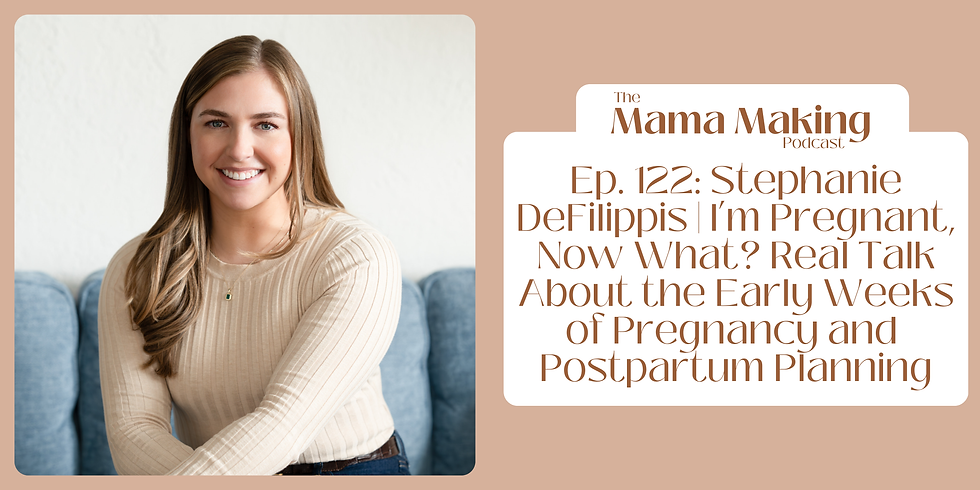S3. Ep 122: Stephanie DeFilippis | I’m Pregnant, Now What? Real Talk About the Early Weeks of Pregnancy and Postpartum Planning
- Jessica Lamb
- Jul 22, 2025
- 3 min read

I’m Pregnant—Now What? Navigating the Early Weeks, Mental Health, and Postpartum Planning
The first few weeks of pregnancy are full of excitement—but they’re also packed with overwhelm. You find out you’re pregnant, and within seconds your brain starts racing: Am I ready? Can I do this? How do I know everything’s okay?
In this episode of The Mama Making Podcast, Jessica sits down with Stephanie DeFilippis, LCSW, founder of Crescent Moon Therapy, to talk about the real side of early pregnancy, mental health, and preparing for postpartum.
Why Does No One Talk About the First Eight Weeks?
There’s a lot of information about trying to conceive. There’s even more about labor, delivery, and “getting your body back.” But those first eight weeks? Crickets.
Most providers don’t even see you until week 8–10 unless you’ve had fertility treatments. That leaves a huge gap where moms are left alone with Google, TikTok, and their spiraling thoughts.
Stephanie shares how normal it is to feel fear—even when the pregnancy is planned.
“I felt like my life was speeding up too fast. It was this feeling of ‘I have to get everything done before the baby comes or life is over.’ And that just isn’t true.”
The Power of Slowing Down
Both Jessica and Stephanie talk about the pressure to do everything at once: build a registry, figure out baby gear, and somehow “prepare for birth” in the first trimester.
Stephanie’s advice? Slow down.
“There’s no master checklist for motherhood, especially not for your mental health. The first trimester is the time to connect to yourself, your body, and your needs.”
She recommends mantras like:
I’m allowed to slow down
There’s no rush
Taking care of myself is taking care of the baby
Why Therapy During Pregnancy Matters
Many moms wait until postpartum to get help—but Stephanie says that starting therapy during pregnancy can prevent deeper struggles later.
Perinatal therapy can help with:
Managing anxiety
Planning for postpartum support
Setting boundaries with your time and energy
Preparing for the identity shift of motherhood
“Women deserve to be held, just as much as babies do.”
Let’s Talk About Postpartum Before It Happens
Stephanie shares why postpartum planning should start during pregnancy—not after the baby is born.
Some ideas include:
Identify three daily self-care actions (like a shower, skincare, or a walk)
Talk to your partner about their role in caring for you postpartum
Decide what kind of help you’ll actually need—someone to hold the baby, or someone to do the laundry?
Line up a therapist or support group before baby arrives
Medication, Mental Health, and Pregnancy
One big topic moms are nervous about? Medication management during pregnancy.
Stephanie emphasizes:
Don’t stop your meds without talking to a provider
There are safe, well-studied medications for pregnancy and postpartum
A stable, healthy parent is safer for the baby than untreated mental health conditions
The Fourth Trimester Deserves More Attention
Most new moms spend their pregnancy worrying about labor and delivery. But the hardest part? Often, it’s the weeks after the baby comes.
Stephanie breaks down the difference between baby blues, postpartum anxiety, and postpartum depression—and shares why having a plan for your recovery matters just as much as packing your hospital bag.
“Even if birth goes perfectly, it’s still a trauma on the body. Recovery deserves just as much attention as labor.”
Final Thoughts: Give Yourself Grace
Whether you’re pregnant for the first time or the fourth, no two experiences are the same. You won’t get it “right” because there’s no one right way.
Your job isn’t to do it perfectly—it’s to stay connected to yourself, ask for help, and give yourself room to grow.
TL;DR
In this episode, Jessica and Stephanie get real about the early weeks of pregnancy, mental health, and how to plan for postpartum without spiraling. From managing anxiety to setting up support systems, this is your permission slip to slow down and care for yourself first.
early pregnancy mental health
first trimester anxiety
I’m pregnant now what
perinatal mental health
motherhood identity shift
postpartum planning
preparing for the fourth trimester
therapy during pregnancy
partner support in postpartum
postpartum mental health care
the mama making podcast, mom podcast, mom pod, pregnancy, postpartum, parenthood, podcasting, parenting podcast, pregnant now what, perinatal mental health, motherhood unfiltered, postpartum planning, working moms, the mama making podcast, real talk motherhood, new mom life, fourth trimester support, mom support network










Comments